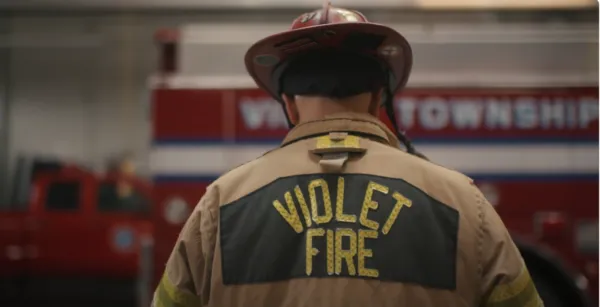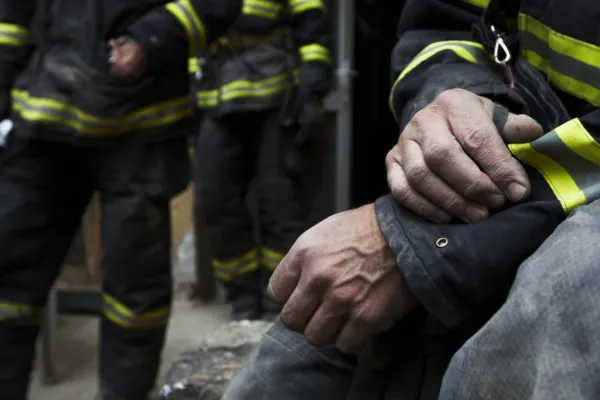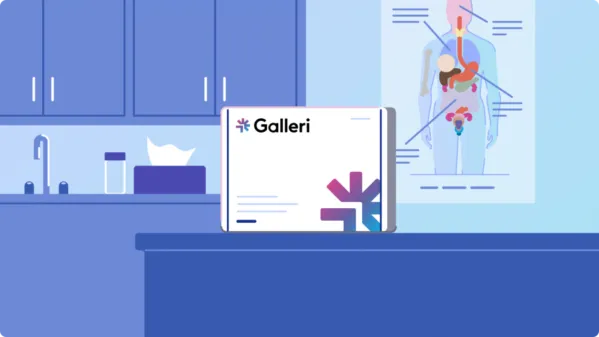To request the test you will need the Galleri Key provided to you by AFFI
Early detection makes a difference.
The Galleri® multi-cancer early detection test screens for a signal shared by more than 50 types of cancer.1
The Galleri test should be used in addition to healthcare provider recommended screening tests. Galleri is a screening test and does not diagnose cancer. Diagnostic testing is needed to confirm cancer.

The Galleri test should be used in addition to healthcare provider recommended screening tests. Galleri is a screening test and does not diagnose cancer. Diagnostic testing is needed to confirm cancer.
Why is early detection important?
The Galleri test allows you to screen for more cancers when used in addition to single cancer screening tests.2,3 The Galleri test identifies DNA in the bloodstream shed by cancer cells and does not predict your future genetic risk for cancer.

Only 5 cancers have have recommended screening tests:
breast, cervical, colorectal, lung (for those at risk), cervical and prostate.2
The Galleri test does not detect a signal for all cancers and not all cancers can be detected in the blood.
False positive and false negative results do occur.
Who is eligible?
AFFI active members and spouses of active members may request the Galleri test at a reduced cost of $649 using the Galleri Key provided to you.
The Galleri test is available by prescription only. The Galleri test is recommended for use in adults with an elevated risk for cancer, such as those aged 50 or older. The Galleri test does not detect all cancers and should be used in addition to routine cancer screening tests recommended by a healthcare provider.
Use of Galleri is not recommended in individuals who are pregnant, 21 years old or younger, or undergoing active cancer treatment.

What is the Galleri test?
Galleri is a multi-cancer early detection (MCED) test that looks for a signal shared by more than 50 types of cancer.1 If a cancer signal is detected, Galleri can predict the tissue type or organ associated with the signal to help healthcare providers determine next steps.
The Galleri test does not detect a signal for all cancers and not all cancers can be detected in the blood. False positive and false negative results do occur. Galleri is a screening test and does not diagnose cancer. Diagnostic testing is needed to confirm cancer.

Understanding your results
You will receive your test result about two weeks after your blood sample is received at the GRAIL lab.
There are two possible results:
- No Cancer Signal Detected
- Cancer Signal Detected
Galleri looks for a signal shared by more than 50 cancer types.1 You will not receive a list of the 50+ types of cancer and a result for each one.
If Galleri detects a cancer signal, your result will include Cancer Signal Origin predictions which provides information about the tissue type or organ associated with the Cancer Signal to help healthcare providers determine next steps.
The Galleri test does not detect a signal for all cancers and not all cancers can be detected in the blood. False positive and false negative results do occur.
A Galleri result of No Cancer Signal Detected does not rule out cancer.
Galleri is a screening test and does not diagnose cancer. Diagnostic testing is needed to confirm cancer.

Frequently Asked Questions
The Galleri test screens for multiple cancers and can be taken annually as a simple blood draw. The test can screen for many aggressive cancers before symptoms appear.3
In a clinical study, the Galleri test detected a signal shared by more than 50 types of cancer.1 See the list of cancer types the Galleri test detected.
Learn more — watch the short video: What is Galleri?
The Galleri test does not detect a signal for all cancers and not all cancers can be detected in the blood. False positive and false negative results do occur. The Galleri test should be used in addition to healthcare provider recommended screening tests.
Cancers growing in the body shed DNA into the bloodstream. Although there are many types of cancer, the DNA fragments act like a unique fingerprint of cancer.1,4,5 The Galleri test can screen for many aggressive cancers before they become symptomatic,3 including those with no recommended screening tests.1,2,6 With this unique “fingerprint” of cancer, the Galleri test helps to provide direction to your healthcare provider on the cancer’s origin and the next steps in diagnosis.3,7
Watch the short video How Does the Galleri Test Work? to learn more.
The Galleri test does not detect a signal for all cancers and not all cancers can be detected in the blood. False positive and false negative results do occur. The Galleri test identifies DNA in the bloodstream shed by cancer cells and does not predict future genetic risk for cancer.
The Galleri test is available by prescription only. To access the Galleri test, request the test through this webpage. An independent telemedicine provider will review your request and order the test, if appropriate.
If you are a first responder, you may request the Galleri test at a reduced cost of $649 using the Galleri Key provided to you.
“First Responder” includes firefighters, police officers, and emergency medical service providers (whether active, volunteer, or retired) and spouses/dependents.
The Galleri test is recommended for use in adults with an elevated risk for cancer, such as those age 50 or older. Use of the Galleri test is not recommended in individuals who are pregnant, 21 years old or younger, or undergoing active cancer treatment.
The Galleri test should be used in addition to healthcare provider recommended screening tests.
More than 1 in 3 people will develop cancer in their lifetime.8 People over the age of 50 are 13 times more likely to have cancer than those under 50.9 Cancer risk increases for everyone as they age, regardless of family history — only 5% to 10% of cancers are inherited.9,10
For firefighters, occupational cancer is the #1 cause of line-of-duty deaths.11
The Galleri test is recommended for use in adults with an elevated risk for cancer, such as those age 50 or older.
Talk to your provider about your risk for cancer and whether the Galleri test is right for you. The Galleri test is available by prescription only.
No. A genetic or hereditary risk assessment is a one-time-only measurement and assesses your future risk of developing cancer.10 The Galleri test is a point-in-time test that identifies DNA in the bloodstream shed by active cancer cells.1
In a clinical study, the Galleri test detected a signal shared by more than 50 types of cancer — including some fast-spreading and aggressive cancers responsible for approximately two-thirds of cancer deaths.1,6 Galleri is a cancer screening test, meaning it looks for cancer before symptoms appear.3
See the list of cancer types study participants had when a cancer signal was detected.4
The Galleri test does not detect a signal for all cancers and not all cancers can be detected in the blood. False positive and false negative results do occur.
Nearly 99% of people (ages 50-79) who take the Galleri test will receive a No Cancer Signal Detected result.3 In other words, approximately 1% are expected to receive a Cancer Signal Detected result. After diagnostic evaluation, around 62% of people with a Cancer Signal Detected result are expected to have a confirmed cancer diagnosis.12*
Some of the ways we measure test accuracy are with positive predictive value (PPV) and a false positive rate. A PPV is the probability that a person with a Cancer Signal Detected test result has cancer (i.e., 62%). The false positive rate was 0.4% for participants without cancer.12*
*Based on the first ~25,000 participants with 1 year of follow-up.
The Galleri test does not detect a signal for all cancers and not all cancers can be detected in the blood. False positive and false negative results do occur. The Galleri test should be used in addition to healthcare provider recommended screening tests.
The Galleri test is commercially available throughout the United States and in select geographic locations through distributors. If you are located in the US, you can request a test through this webpage. An independent provider will review your request and order the test, if appropriate.
If you are a first responder, you may request the Galleri test at a reduced cost of $649 using the Galleri Key provided to you. “First responders” include firefighters, police officers, and emergency medical service providers (whether active, volunteer, or retired) and spouses/dependents.
You may be able to use pretax dollars in your flexible spending account (FSA) or health savings account (HSA) to pay for the Galleri test. Check with your FSA or HSA administrator or insurance provider to determine eligibility.
When requesting the Galleri test, you will need to provide a “Galleri Key” to ensure that you receive the reduced price for first responders. You can find your Galleri Key on the communication you received from your department/union.
The blood draw is included in the price if the test is scheduled with one of our GRAIL lab partners. Find a convenient time and location to schedule your blood draw at home, your doctor’s office, or a partner lab by a trained technician.
Explore our payment options to determine which is right for you, or call our Customer Service team at (833) 694‑2553 for additional information.
A limited number of health insurance plans currently cover the Galleri test. The test represents a significant innovation in cancer screening, and coverage with payers will continue to evolve over time. Patients may elect to pay for the test themselves and/or check with their insurer for coverage before requesting the test.
You may be able to use pretax dollars in your flexible spending account (FSA) or health savings account (HSA) to pay for the Galleri test. Check with your FSA or HSA administrator or insurance provider to determine eligibility.
When you’re ready to take the Galleri test, you can schedule your blood draw at a time and place convenient for you:
- One of our GRAIL partner labs
- Your home, office, or any preferred location by a trained technician
Watch the Clinical Laboratory Virtual Tour video to learn more about how your sample is processed at the GRAIL lab.
First, do not break the quality seal on your sample collection kit. The kit should be opened by the trained technician who draws your blood sample. Make sure you store it at room temperature until your blood draw appointment. The contents are sensitive to extreme temperatures. For example, avoid storing your collection kit in the trunk of your car for long periods of time.
The trained technician who draws your blood will pack and ship your sample to the GRAIL laboratory for processing.
No, fasting is not required for the Galleri test.
Approximately 1.5 tablespoons (or about 20 mL) of blood in two tubes is typically drawn from a vein in your arm.
If you no longer wish to receive your Galleri test result, please contact GRAIL Customer Service by completing the online form on the Contact Us web page or by calling (833) 694‑2553.
You will be responsible for the cost if the GRAIL laboratory has already processed your test.
Typically, you can expect to receive your test result about 2-3 weeks after your sample arrives at the GRAIL lab. In certain cases, results may take up to 4 weeks.
If you have not received your result within 2 weeks, GRAIL will notify you via email (sent to your email address if one was provided on your Test Requisition Form).
It is important to understand that the timing of your test result does not indicate or predict the outcome of the test, nor does it impact the accuracy of the final result.
If you provide your email when ordering the test, your result will be emailed to you. You can also request your test result by contacting GRAIL Customer Service via the Contact Us online form or call (833) 694‑2553.
The Galleri test detected DNA methylation patterns often associated with cancer in your blood sample. About 1 out of every 100 tests has a Cancer Signal Detected result.3
This result will also include a prediction of the tissue type or organ associated with the cancer signal, called a Cancer Signal Origin (CSO). The CSO helps your doctor determine the next steps for diagnosis.1
A healthcare provider should interpret the results. The test result is not a cancer diagnosis and requires follow-up diagnostic testing, which may include lab work or imaging ordered by your healthcare provider to confirm cancer. GRAIL also offers patients and providers additional support and resources if needed to help guide the next steps.
The Galleri test does not detect a signal for all cancers and not all cancers can be detected in the blood. False positive and false negative results do occur.
The Galleri test did not detect DNA methylation patterns associated with cancer in your blood sample. Nearly 99% of people who use the Galleri test will receive a No Cancer Signal Detected result.3
This result does not completely rule out the possibility of cancer, and you should continue with other cancer screenings your provider recommends. While the Galleri test is a powerful tool, it cannot detect a signal for all cancers and not all cancers can be detected in the blood. Some cancers shed little or no DNA into the bloodstream, which makes them unlikely to be detected through a blood test (e.g., brain, skin, and early breast and prostate cancers).13 False positive and false negative results do occur. The Galleri test identifies DNA in the bloodstream shed by cancer cells and does not predict future genetic risk for cancer.
The Galleri test can be taken as an annual blood test. Adding the Galleri test to yearly wellness visits can improve your chance of finding a cancer signal early, when more treatment options may be available.14 Ask your healthcare provider when it is best to test again.
The Galleri test is intended to be used in addition to — and not replace — other cancer screening tests your healthcare provider recommends. Single-cancer screening tests are recommended because they have been proven to save lives by detecting cancer early. Adding the Galleri test to annual wellness visits can improve your chance of finding a cancer signal early, when more treatment options may be available.14
The Galleri test does not detect a signal for all cancers and not all cancers can be detected in the blood.
A Cancer Signal Detected test result is not a cancer diagnosis and requires follow-up diagnostic testing to confirm cancer. Follow-up diagnostics may include lab work or imaging ordered by your healthcare provider to confirm cancer. GRAIL also offers patients and providers additional support and resources if needed to help guide the next steps.
Cancer can be unpredictable. The Galleri test can be taken annually and added to your yearly wellness visits. Aggressive cancers can develop and progress quickly, sometimes in less than a year.14,15 Ask your healthcare provider when would be the best time to schedule your next test.
All results are automatically shared with the provider who ordered the test. If you would like us to fax your result to an additional healthcare provider, contact GRAIL Customer Service and complete the online form on the Contact Us web page or call (833) 694‑2553 to receive instructions on how to complete a results release form.
Your employer only receives de-identified and aggregated information across all participants (e.g. how many tests have been requested) and will not receive individual results.
Get support
By email: customerservice@grail.com
By telephone: (833) 694‑2553
The Galleri test is recommended for use in adults with an elevated risk for cancer, such as those age 50 or older. The test does not detect all cancers and should be used in addition to routine cancer screening tests recommended by a healthcare provider. The Galleri test is intended to detect cancer signals and predict where in the body the cancer signal is located. Use of the test is not recommended in individuals who are pregnant, 21 years old or younger, or undergoing active cancer treatment.
Results should be interpreted by a healthcare provider in the context of medical history, clinical signs, and symptoms. A test result of No Cancer Signal Detected does not rule out cancer. A test result of Cancer Signal Detected requires confirmatory diagnostic evaluation by medically established procedures (e.g., imaging) to confirm cancer.
If cancer is not confirmed with further testing, it could mean that cancer is not present or testing was insufficient to detect cancer, including due to the cancer being located in a different part of the body. False positive (a cancer signal detected when cancer is not present) and false negative (a cancer signal not detected when cancer is present) test results do occur. Rx only.
The GRAIL clinical laboratory is certified under the Clinical Laboratory Improvement Amendments of 1988 (CLIA) and accredited by the College of American Pathologists. The Galleri test was developed — and its performance characteristics were determined — by GRAIL. The Galleri test has not been cleared or approved by the Food and Drug Administration. The GRAIL clinical laboratory is regulated under CLIA to perform high-complexity testing. The Galleri test is intended for clinical purposes
- Klein EA, Richards D, Cohn A, et al. Clinical validation of a targeted methylation-based multi-cancer early detection test using an independent validation set. Ann Oncol. 2021;32(9):1167-77. DOI: https://doi.org/10.1016/j.annonc.2021.05.806.
- US Preventive Services Task Force (USPSTF) recommended cancer screening tests, Grade A,B,C. https://www.uspreventiveservicestaskforce.org/uspstf/topic_search_results
- Schrag D, Beer TM, McDonnell CH, et al. Blood-based tests for multi-cancer early detection (PATHFINDER): a prospective cohort study. Lancet. 2023;402:1251-1260. doi: 10.1016/S0140-6736(23)01700-2.




